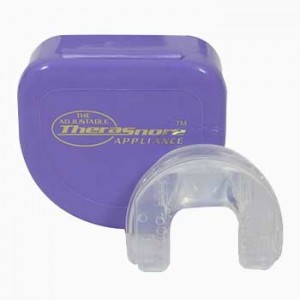 The TheraSnore mouthpiece is a custom one piece oral appliance that's purpose is to keep you from snoring at night. This particular oral mouthpiece was introduced in 1987, which makes it pretty old in terms of these devices. The device was originally recommended for patients who grind their teeth heavily at night but has also been found to be useful for people that snore at night as well. A happy accident for its developers, no doubt.
The TheraSnore mouthpiece is a custom one piece oral appliance that's purpose is to keep you from snoring at night. This particular oral mouthpiece was introduced in 1987, which makes it pretty old in terms of these devices. The device was originally recommended for patients who grind their teeth heavily at night but has also been found to be useful for people that snore at night as well. A happy accident for its developers, no doubt.
This anti-snoring mouthpiece is slightly smaller in size when compared to other mouthpieces in its category.
The TheraSnore has a high success rate for the treatment of simple snoring as a result of mild to moderate obstructive sleep apnea. This particular mouthpiece will usually last between one and two years but if you take care of the device, there is a possibility that it will last for a longer period of time.
How The TheraSnore Mouthpiece Works
The TheraSnore mouthpiece is custom made for each person and the sizing process is performed chair-side at your dentist's office. In many cases, you can actually take home your new mouthpiece on the same day that you are fitted for it. The TheraSnore mouthpiece, like most Mandibular Advancing Devices, gently holds the mandible (your jaw) in a slightly protrusive position so that airways do not become obstructed when you are sleeping. With this device, a post on the lower portion of the mouthpiece sits very gently behind your lower incisors, which in turn prevents your lower jaw from falling back, which is what tends to obstruct the airway and cause that rough snoring sound.
The TheraSnore mouthpiece is made from both a hard acrylic plastic and a soft thermal plastic. The different types of plastic are what allows for the mouthpiece to be comfortable for you to wear and for it to have a tight fit. Many people say that the TheraSnore mouthpiece fits much like a sports mouth guard. This is a pretty common comment for most MAD mouthpieces.
The TheraSnore mouthpiece is designed and trimmed to the shape of your mouth so that there shouldn’t be any TMJ pain or tooth movement when you wear it. This is a big deal for many TMJ sufferers because for them many anti-snoring mouthpieces are simply not wearable. It is very common for most people to experience excess salivation during the night when first wearing a mouthpiece but this problem will usually go away within about one week's time. Any type of anti-snoring mouthpiece is going to take you some time to get used to wearing at night.
Do not give up on wearing the mouthpiece because it is uncomfortable or if you have excessive saliva – it is very likely going to take just a very small amount of time for you to get used to wearing the device.
The Features And Benefits of TheraSnore
- The TheraSnore mouthpiece is the perfect oral appliance for you if you have heavy bruxers (if you are a person who grinds your teeth heavily, especially at night).
- The mouthpiece is custom fit entirely at your dentist’s office and takes approximately 30 to 45 minutes for a fitting.
- TheraSnore is easy to maintain and keep clean with cleaners. The better you take care of and clean the device, the longer it is going to last.
- A smaller mouthpiece is great for people who are sensitive to having something in their mouth or have a strong gag reflex. The TheraSnore is quite comfortable once you get used to it.
- The device is FDA-cleared for snoring and obstructive sleep apnea. This is an important distinction that most high quality mouthpieces share.
Adjustable TheraSnore Mouthpieces
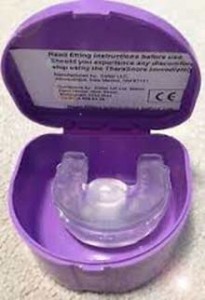 There are also adjustable TheraSnore anti-snoring mouthpieces that one can purchase. These adjustable mouthpieces are a custom chair side fit two-piece appliance that can be adjusted in 1.5 millimeter increments specifically by your dentist. There is no need for laboratories, impressions or models in order for you get fitted for it. The minimal adjustments can be made in just seconds without the need to completely re-fit the mouthpiece.
There are also adjustable TheraSnore anti-snoring mouthpieces that one can purchase. These adjustable mouthpieces are a custom chair side fit two-piece appliance that can be adjusted in 1.5 millimeter increments specifically by your dentist. There is no need for laboratories, impressions or models in order for you get fitted for it. The minimal adjustments can be made in just seconds without the need to completely re-fit the mouthpiece.
The adjustable TheraSnore advances the mandible by gently holding it in a protrusive position. When wearing this mouthpiece, you will have complete vertical and lateral freedom of movement – your jaw and mouth is not in a locked position as with many of the other anti-snoring mouthpieces you will find out there. These devices can be fit in your dentist office in less than 40 minutes.
FDA Clearance
The adjustable TheraSnore received the Food and Drug Administration (FDA) 510(k) clearance to treat obstructive sleep apnea. Previously, the oral appliance had FDA clearance to treat snoring only. This is huge achievement – the mouthpiece can be used all around for people with snoring and sleep apnea problems.
Conclusion
You are going to be highly impressed with this anti-snoring mouthpiece. Before you can get the TheraSnore mouthpiece, you need to go to your dentist to get fitted for it. The mouthpieces are custom-fitted for your mouth. They are smaller in size than most of your regular anti-snoring mouthpieces and this is what makes them much more comfortable. If you have dental insurance, this is definitely something you are going to want to try — you cannot go wrong in trying one of these great devices out because they really do work.

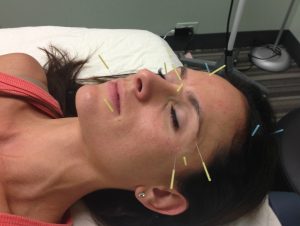
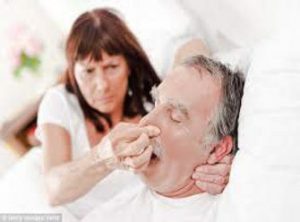
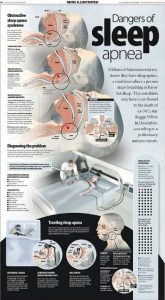
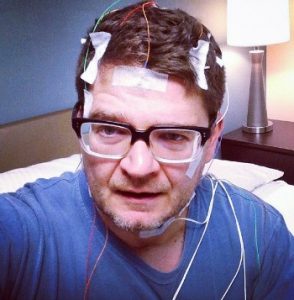
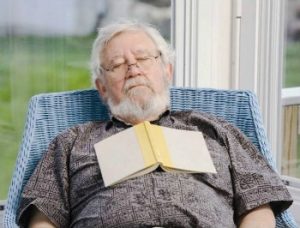
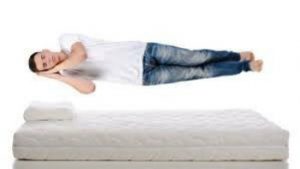
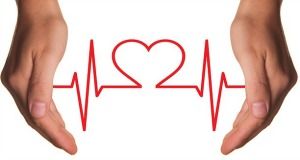
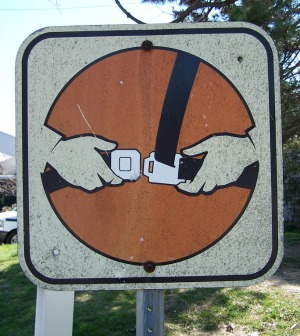 mouthpiece. Some of these are tested and true, do what they’re supposed to do and are only slightly uncomfortable (as you’ll read about in our
mouthpiece. Some of these are tested and true, do what they’re supposed to do and are only slightly uncomfortable (as you’ll read about in our